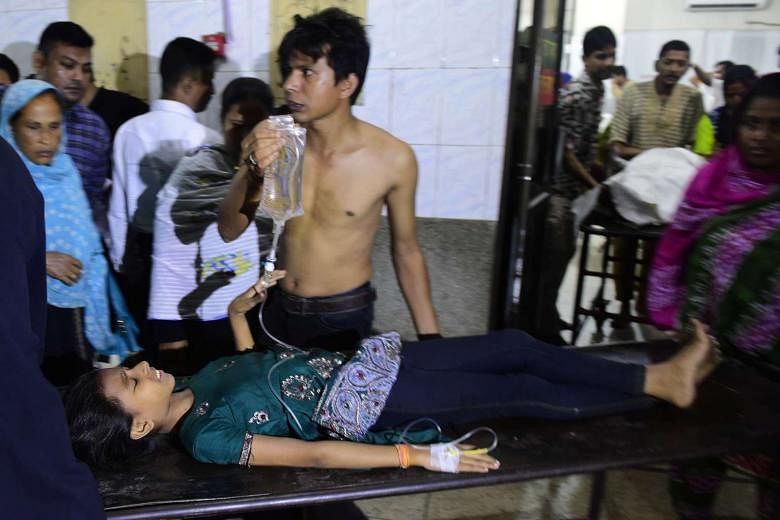DHAKA (AFP) - The Islamic State in Iraq and Syria (ISIS) group claimed responsibility for the bombing of the main Shi'ite shrine in the Bangladeshi capital on Saturday (Oct 24) that killed one person and wounded nearly 80, as thousands gathered for the annual Ashura procession.
The rare attack on Bangladesh's tiny Shi'ite Muslim community comes just weeks after an Italian aid worker and a Japanese farmer were shot dead in attacks also claimed by ISIS - although authorities reject the claims.
Officers said a 14-year-old boy died on the spot after three small bombs were thrown at the complex of the Hossaini Dalan, the main Shi'ite site in the old Mughal quarter of Dhaka, at about 2am Saturday local time.
"There were some 20,000 people in and outside the building at that time. They were preparing to hold the annual Muharram mourning procession when the three (bombs) were exploded," deputy commissioner of Dhaka Police Mofiz Uddin Ahmed told AFP.
The ISIS group later claimed the killing on Twitter, according to the SITE Intelligence Group, a US monitoring organisation, but police said they had found no evidence to show the extremists were behind the blasts.
"So far we have not found any link to any militant group in the attack," Dhaka police spokesman Muntashirul Islam told AFP.
The attacks come as Shi'ites around the world mark the holy month of Moharram. Pakistan's Shi'ites have also suffered sectarian violence this week after two suicide blasts killed at least 27 people.
In Bangladesh, television showed live footage of the chaos in the aftermath of the blasts with fleeing people holding flags and ambulances taking the injured to hospital.
Police said around 80 people were injured in the attack on the 17th century religious site, at least one critically.
The Rapid Action Battalion, the country's elite security force, said it believed the bombs used were improvised explosive devices (IEDs).
"We've recovered similar IEDs from the Islamist militants in the past," RAB deputy spokesman Major Maqsudul Alam told AFP.
Authorities have yet to make any arrests in connection with the blasts but three people have been taken in for questioning, police inspector Mohammad Murad told AFP.
Home Affairs minister Asaduzzaman Khan Kamal told local media that authorities had video footage of the blasts and he hoped they could quickly track down the attackers.
Ashura marks the climax of the holy month of Muharram when Shi'ites hold processions and gatherings to mourn the martyrdom of the Prophet Muhammad's grandson Imam Hussain at the Battle of Karbala in Iraq in 680AD.
Witnesses told the mass-circulation daily Prothom Alo that many mourners fell to the ground as loud explosions went off at the main gate of the Hossaini Dalan, the most important prayer and congregation site for Bangladesh's Shi'ites.
Mr Roni, who uses one name, said mourners dressed in black were holding prayers just before the procession when he heard eight to 10 explosions and saw a fire.
Security was stepped up at Shi'ite mosques across the country immediately after the attack and mourners in Dhaka's Mohammadpur neighbourhood banned women and children from the procession.
Defying the attack, about 20,000 Shi'ites continued the procession in Dhaka, police and an AFP photographer at the scene said, cutting their bodies with knives and iron chains in a religious ritual.
"We've been observing this mourning procession here for centuries. But we've never seen any incident like this. We demand a quick and fair investigation into the blasts," a leader of the Shi'ite community at Hossaini Dalan told reporters.
The explosions come as tensions run high in Bangladesh after ISIS claimed its first attacks in the mainly moderate Sunni Muslim-majority country of 160 million people.
While the blasts are believed to be the first attack on Shi'ites in Bangladesh, in the past two years banned Islamist militant groups have killed more than a dozen Sufi Muslims and attacked Hindus and Christians.
The killing of four atheist bloggers this year has also undermined government efforts to play down the threat posed by hardliners, experts say.

